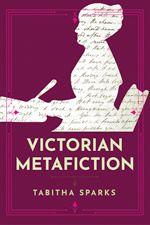Today, we are happy to bring you our conversation with Tabitha Sparks, author of Victorian Metafiction
What inspired you to write this book?
Much of the work that humanities scholars are doing right now is justified by its activist and practical impact, and this puts pressure on those of us who work in historical fields. But historical perspective uncovers causality that we can’t appreciate in the present. This book traces how the formal technique of metafiction enabled women writers to advance their novels from a second-rate status for most of the 19th C to ‘high art’ by the modernist era. But the story it tells emerges cumulatively: taken in isolation or appreciated in their own period, none of the novels I examine could reveal the artistic innovation that happens over time.
What did you learn and what are you hoping readers will learn from your book?
I read a lot of totally obscure novels – far more than made it into the book – without knowing what they would tell me. I learned how misleading our conventional categorizations of the novel could be: florid romances can also be very funny (intentionally); novels that turn upon absurd coincidences can also be sophisticated (formally). I hope readers can think about esoteric novels as an exciting resource for all sorts of arguments we haven’t attached to the canon.
What surprised you the most in the process of writing your book?
The critical apprehension of Victorian novels by critics working in other fields – particularly postmodernism – is not just reductive but often wrong. The Victorian novel is widely used to prop up a realistic conceit that then paves the way for 20th century formal innovators to react against. In effect, the narrative definition of metafiction relies on a characterization of the Victorian or nineteenth-century novel that few of us working in the field would recognize, which explains why the subject of Victorian metafiction has received so little explicit attention. As I was writing the book, the pairing of “Victorian” and “metafiction” surprised a lot of people, some of whom thought they had misheard me, or gently offered definitions of metafiction.
What’s your favorite anecdote from your book?
Maybe when Trollope’s narrator in the short story “Mary Gresley” lovingly compares the heroine to a dog and uses the reference to explain why she was unfit to be a writer.
What’s next?
I don’t know. But what has worked for me pretty well in the past is focusing a great deal of attention on a seemingly innocuous topic or text, assuming that I don’t understand anything about its original purpose or appeal and using that as a starting point. This is advice that in my other job as an associate dean of research would not be well received. The humanities scholar in me is perversely excited by projects that may not overtly scream “lucrative grant” or “international networking opportunity” but have much to teach us, nevertheless.





